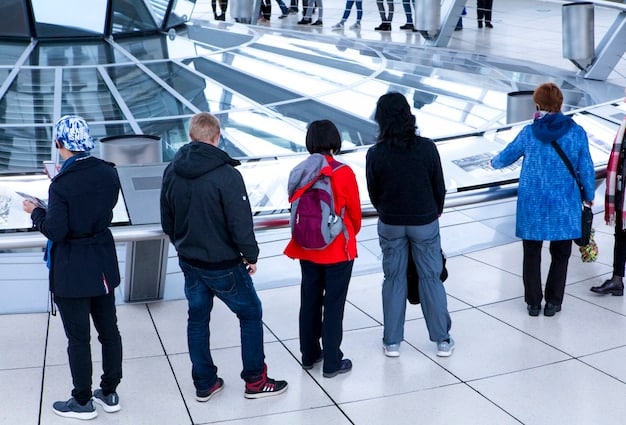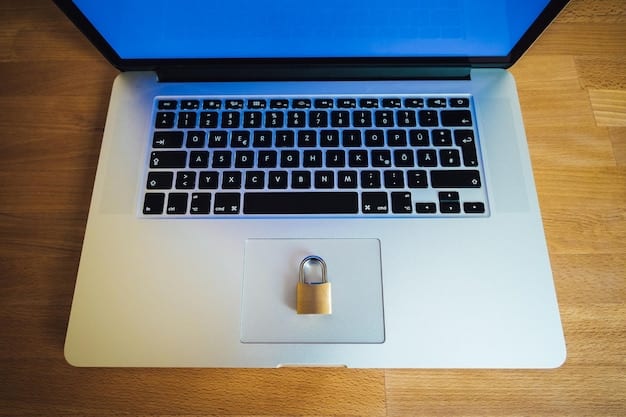Stay Safe While Traveling: 7 Essential Tips for US Travelers in 2025

Staying safe while traveling in 2025 involves planning, awareness, and using modern tools; this article outlines seven essential safety tips for US travelers, covering everything from travel insurance to digital security and health precautions.
Traveling enriches our lives with new experiences and perspectives. However, ensuring your safety while exploring new places is paramount. As we approach 2025, it’s crucial to stay informed about potential risks and adopt proactive measures to protect yourself. This article provides seven essential stay safe while traveling: 7 essential safety tips for US travelers in 2025 that will help US travelers minimize risks and maximize enjoyment on their trips.
Plan Ahead and Research Your Destination
Thorough planning is the foundation of a safe trip. Before you even pack your bags, dedicate time to researching your destination. Understanding local laws, customs, and potential hazards can significantly reduce your risk of encountering problems.
Start by consulting travel advisories issued by the US Department of State. These advisories provide up-to-date information on safety and security conditions in various countries, including potential terror threats, crime rates, and health risks. Armed with this knowledge, you can make informed decisions about where to go and how to prepare.
Understand Local Laws and Customs
Familiarize yourself with the laws and customs of your destination. What is considered acceptable behavior in the US may be frowned upon or even illegal elsewhere. For example, public drinking laws vary widely across the globe. Knowing these nuances can help you avoid unintentional violations and maintain good relationships with locals.
Identify Potential Hazards
Research potential hazards specific to your destination. This might include natural disasters like hurricanes, earthquakes, or volcanic activity. It could also involve understanding local crime trends, such as pickpocketing in crowded tourist areas or scams targeting foreigners. Being aware of these risks allows you to take precautions and minimize your vulnerability.
- Register with the Smart Traveler Enrollment Program (STEP): STEP allows you to receive important information from the Embassy about safety conditions in your destination, helping you make informed decisions about your travel plans. It also helps the Embassy contact you in an emergency, whether natural disaster, civil unrest, or family emergency.
- Make Copies of Important Documents: Keep digital and physical copies of your passport, driver’s license, credit cards, and travel itinerary in separate locations. This ensures you have access to essential information even if your originals are lost or stolen.
- Share Your Itinerary: Share your travel itinerary with a trusted friend or family member. Include your flight details, accommodation information, and planned activities. This allows them to keep track of your whereabouts and assist you in case of an emergency.
By planning ahead and conducting thorough research, you set the stage for a safer and more enjoyable travel experience. Knowing what to expect and how to respond to potential challenges enhances your confidence and resilience on the road.
Invest in Comprehensive Travel Insurance
Travel insurance is a crucial safety net for any traveler. It provides financial protection and assistance in unexpected situations, such as medical emergencies, trip cancellations, lost luggage, or theft. Investing in a comprehensive travel insurance policy can give you peace of mind and safeguard your financial well-being.
Before purchasing a policy, carefully review the coverage details to ensure it meets your specific needs. Consider factors such as the destinations you’ll be visiting, the activities you’ll be engaging in, and your personal health conditions. Look for policies that cover a wide range of potential issues.

Medical Coverage
Medical emergencies can happen anywhere. Your domestic health insurance may not cover you overseas. A good travel insurance policy should cover medical expenses, including hospitalization, doctor visits, prescription medications, and emergency medical evacuation. Make sure the policy has adequate coverage limits to handle potentially high medical costs.
Trip Cancellation and Interruption
Unexpected events can disrupt your travel plans. A travel insurance policy that covers trip cancellation and interruption can reimburse you for non-refundable expenses, such as flights and hotel bookings. This coverage can be invaluable if you need to cancel your trip due to illness, injury, or a family emergency.
- Read the Fine Print: Understand the exclusions and limitations of your travel insurance policy. Some policies may exclude coverage for pre-existing medical conditions or high-risk activities. Knowing these details can help you avoid unpleasant surprises when filing a claim.
- Keep Policy Information Handy: Carry a copy of your travel insurance policy and contact information with you at all times. Store a digital copy on your phone or tablet. In case of an emergency, you’ll have quick access to the information you need.
- Consider Additional Coverage: Depending on your travel plans, you may want to consider additional coverage options, such as rental car insurance or adventure sports coverage. Assess your risks and choose a policy that provides adequate protection.
Investing in comprehensive travel insurance is a smart way to protect yourself from financial losses and ensure you receive the necessary assistance in case of an emergency. Don’t leave home without it.
Practice Situational Awareness
Situational awareness is the practice of being aware of your surroundings and potential threats. It involves paying attention to what’s happening around you, identifying possible dangers, and taking appropriate action to protect yourself. Developing strong situational awareness skills can help you avoid dangerous situations and respond effectively if something goes wrong.
Start by minimizing distractions. Put away your phone, remove your headphones, and focus on your surroundings. Observe the people around you, noting their behavior and any potential warning signs. Trust your instincts. If something feels off, remove yourself from the situation.
Be Mindful of Your Belongings
Protect your belongings from theft by keeping them close and out of sight. In crowded areas, wear your backpack in front of you or use a crossbody bag with a secure closure. Avoid displaying expensive jewelry or electronics that could attract unwanted attention. Be vigilant in public transportation, airports, and tourist attractions, where pickpockets are common.
Avoid Risky Areas
Research potentially dangerous areas in your destination and avoid them, especially at night. Stick to well-lit, populated streets and avoid walking alone in unfamiliar places. If you feel unsafe, take a taxi or rideshare service to your destination. Be cautious when accepting drinks or invitations from strangers.
- Trust Your Gut: If a situation feels uncomfortable or unsafe, trust your instincts and remove yourself from it. Don’t worry about being impolite or offending someone. Your safety is the top priority.
- Learn Basic Self-Defense: Consider taking a self-defense class to learn basic techniques for protecting yourself. Knowing how to defend yourself can boost your confidence and give you a fighting chance in a dangerous situation.
- Carry a Personal Safety Alarm: A personal safety alarm can deter potential attackers and attract attention in an emergency. Keep it easily accessible in your pocket or bag.
Practicing situational awareness is a simple but effective way to enhance your safety while traveling. By staying alert and mindful of your surroundings, you can reduce your risk of becoming a victim of crime and respond effectively to potential threats.
Secure Your Digital Information
In today’s digital age, protecting your digital information is just as important as safeguarding your physical belongings. When traveling, you’re more vulnerable to cyber threats, such as hacking, phishing, and identity theft. Taking steps to secure your digital devices and data can help you avoid these risks and protect your privacy.
Start by using strong, unique passwords for all your online accounts. Avoid using the same password for multiple accounts. Enable two-factor authentication whenever possible, which adds an extra layer of security by requiring a verification code from your phone or email in addition to your password.
Use a Virtual Private Network (VPN)
A VPN encrypts your internet traffic and protects your data from being intercepted by hackers. Use a VPN when connecting to public Wi-Fi networks, such as those in airports, hotels, and cafes. This prevents hackers from stealing your personal information, such as passwords and credit card details.
Be Cautious of Phishing Scams
Phishing scams are designed to trick you into revealing your personal information. Be wary of suspicious emails, text messages, or phone calls asking for your passwords, credit card numbers, or other sensitive data. Never click on links or open attachments from unknown sources. Verify the authenticity of any request before providing any information.

- Update Your Software: Keep your operating system, web browser, and antivirus software up to date. Software updates often include security patches that fix vulnerabilities that hackers could exploit.
- Back Up Your Data: Before you travel, back up your important files to a secure cloud storage service or external hard drive. This ensures you won’t lose your data if your device is lost, stolen, or damaged.
- Wipe Your Device: If you’re traveling to a high-risk country, consider using a dedicated travel device and wiping it clean when you return. This protects your personal data from being compromised if your device is confiscated or hacked.
Securing your digital information is essential for protecting your privacy and financial security while traveling. By following these tips, you can minimize your risk of becoming a victim of cybercrime and enjoy a safer online experience.
Stay Connected and Communicate Regularly
Staying connected with loved ones is crucial for both your safety and peace of mind while traveling. Regular communication allows you to stay informed about current events, seek assistance in an emergency, and reassure your family and friends that you’re safe and well. Make sure you have reliable communication options and stay in touch regularly.
Purchase an international SIM card or travel Wi-Fi hotspot to ensure you have access to reliable internet and phone service. Download communication apps like WhatsApp, Skype, or Viber, which allow you to make free calls and send messages over Wi-Fi. Set up a communication schedule with your family and friends, so they know when to expect to hear from you.
Share Your Location
Use location-sharing apps like Google Maps or Find My Friends to share your real-time location with trusted contacts. This allows them to track your whereabouts and assist you in case of an emergency. Make sure your privacy settings are configured to only share your location with specific individuals.
Keep Emergency Contacts Handy
Create a list of emergency contacts, including your family members, friends, travel insurance provider, and local embassy or consulate. Store this list on your phone, in your email, and in a physical copy in your wallet or passport. In case of an emergency, you’ll have quick access to the information you need.
- Stay Informed: Monitor local news and social media for updates on current events, safety alerts, and travel advisories. Be aware of any potential risks or disruptions that could affect your travel plans.
- Check in Regularly: Make a habit of checking in with your family and friends regularly, even if you don’t have anything specific to report. A quick message or phone call can reassure them that you’re safe and well.
- Use Social Media Wisely: Avoid posting real-time updates about your location and activities on social media. This could make you a target for thieves or other criminals. Wait until you’ve left a location to post about it.
Staying connected and communicating regularly is a simple but effective way to enhance your safety and maintain peace of mind while traveling. By keeping in touch with loved ones and staying informed about current events, you can minimize your risk of encountering problems and ensure you have support when you need it most.
Prioritize Your Health and Well-being
Maintaining your health and well-being is essential for a safe and enjoyable travel experience. Travel can be physically and mentally demanding, so it’s important to take steps to protect your health and avoid illness or injury. Consult your doctor before you travel, get necessary vaccinations, and pack a comprehensive first-aid kit.
Schedule a check-up with your doctor to discuss your travel plans and any potential health risks associated with your destination. Get recommended vaccinations and booster shots to protect yourself from diseases like yellow fever, typhoid, or malaria. Pack a first-aid kit containing essential medications, bandages, antiseptic wipes, and pain relievers.
Eat and Drink Safely
Be cautious about what you eat and drink, especially in developing countries. Drink bottled or purified water, avoiding tap water and ice cubes. Eat at reputable restaurants and avoid street food vendors with questionable hygiene practices. Wash your hands frequently with soap and water, especially before meals.
Get Enough Rest
Travel can disrupt your sleep patterns and lead to fatigue. Aim for at least seven to eight hours of sleep per night to stay rested and alert. Adjust your sleep schedule gradually to minimize jet lag. Avoid excessive alcohol consumption, which can impair your judgment and weaken your immune system.
- Stay Hydrated: Drink plenty of water to stay hydrated, especially in hot climates or during strenuous activities. Avoid sugary drinks and excessive caffeine, which can dehydrate you.
- Protect Yourself from the Sun: Wear sunscreen, sunglasses, and a hat to protect yourself from the sun’s harmful rays. Avoid prolonged sun exposure, especially during the peak hours of the day.
- Be Mindful of Altitude: If you’re traveling to high altitudes, take it easy and allow your body to adjust gradually. Avoid strenuous activities and drink plenty of water. Be aware of the symptoms of altitude sickness, such as headache, nausea, and shortness of breath.
Prioritizing your health and well-being is crucial for a safe and enjoyable travel experience. By taking care of your physical and mental health, you can reduce your risk of illness or injury and make the most of your trip.
Respect Local Laws and Customs
Respecting local laws and customs is essential for ensuring a positive and safe travel experience. What is considered acceptable behavior in the US may be frowned upon or even illegal elsewhere. Familiarize yourself with the laws, customs, and cultural norms of your destination and act accordingly.
Dress modestly in conservative cultures, especially when visiting religious sites. Avoid public displays of affection that may be considered inappropriate. Learn a few basic phrases in the local language, such as “hello,” “thank you,” and “excuse me.” This shows respect and can help you communicate with locals.
Be Aware of Cultural Differences
Be aware of cultural differences in communication styles, body language, and personal space. Avoid making assumptions or generalizations about people based on their ethnicity, religion, or nationality. Be open-minded and respectful of different perspectives and beliefs.
Follow Local Laws and Regulations
Familiarize yourself with the local laws and regulations of your destination. Avoid engaging in illegal activities, such as drug use, prostitution, or theft. Be aware of local traffic laws and drive safely. Respect local customs and traditions, even if you don’t understand them.
- Ask Questions: If you’re unsure about something, don’t hesitate to ask a local for clarification. Most people are happy to help tourists and share their culture.
- Be Polite: Be polite and courteous in your interactions with locals. Avoid being demanding or entitled. Treat everyone with respect, regardless of their social status or occupation.
- Learn from Your Experiences: Use your travel experiences as an opportunity to learn about different cultures and broaden your horizons. Be open to new ideas and perspectives.
Respecting local laws and customs is essential for ensuring a positive and safe travel experience. By being mindful of cultural differences and acting responsibly, you can build bridges with locals and create lasting memories.
| Key Point | Brief Description |
|---|---|
| 🗺️ Destination Research | Understand local laws, customs, and potential hazards. |
| 🛡️ Travel Insurance | Invest in comprehensive coverage for medical emergencies and trip disruptions. |
| 📱 Digital Security | Secure your digital information with strong passwords and VPNs. |
| 🏥 Health Precautions | Prioritize your health by getting vaccinations and eating safely. |
Frequently Asked Questions (FAQ)
Report the loss or theft to the local police and the nearest US embassy or consulate immediately. Obtain a replacement passport and keep copies of your important documents separate from the originals.
Keep your valuables out of sight and close to your body. Use a crossbody bag with a secure closure or wear your backpack in front of you. Be vigilant and aware of your surroundings at all times.
In many countries, tap water is not safe to drink. Stick to bottled or purified water and avoid ice cubes made from tap water. Use bottled water for brushing your teeth as well.
Include essential medications, bandages, antiseptic wipes, pain relievers, diarrhea medication, and any personal prescriptions. Add insect repellent and sunscreen for additional protection.
Purchase an international SIM card or travel Wi-Fi hotspot. Use communication apps like WhatsApp or Skype to make free calls and send messages over Wi-Fi. Set up a communication schedule to check in regularly.
Conclusion
Ensuring your safety while traveling in 2025 requires a combination of thorough planning, proactive measures, and awareness of your surroundings. By following these seven essential safety tips, you can minimize risks, protect yourself from potential threats, and enjoy a more secure and rewarding travel experience. Safe travels!





